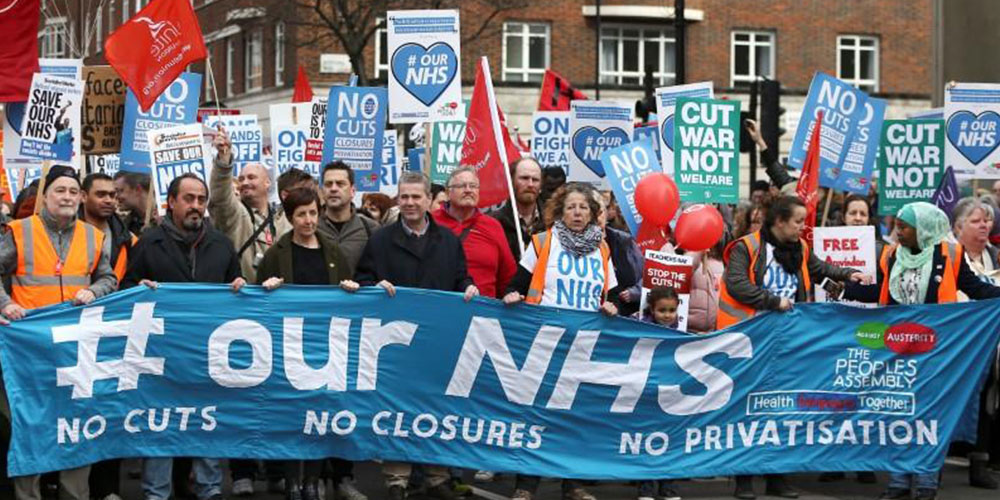ASIA’S ACQUITTAL WELCOMED IN UK
- 10 Nov - 16 Nov, 2018
Over the last seven years, Britain has been under a severe austerity programme leading to huge cuts in public expenditure. The aim of this politically very unpopular exercise is to reduce the budget deficit, but one struggles to understand how it is that a country with a per capita income of over $43,000 per annum can be struggling to provide some facilities which in the developed world are considered basic.

Perhaps the department which has had to face the brunt of these austerity measures is the all important National Health Service, the most important public service on which elections are won and lost. Recently, an acquaintance of mine in London went to Spain, a country he visits every year as he has a Spanish wife. He is a British citizen and while in Spain he fell ill with a urinary problem. He was taken immediately to the local hospital – and this was not in any of the big cities of Spain like Madrid or Barcelona or Seville. He was examined by a doctor, had a blood test and a scan done, the doctor looked at the report and prescribed the necessary medicines for him all in the course of just two hours. Here in the UK, it is not unusual for patients who go to hospital emergencies to have to wait for six hours or more before they are seen by a doctor. The entire course of treatment described above would have taken the better part of half a day. And yet, Spain is not even nearly as rich a country as the UK.
Money then, is not the only thing that makes the wheel go around. Recently, an issue came to light which shows where at least part of the problem may lie. A Member of Parliament belonging to the Scottish National Party (SNP) brought up an astounding piece of information in Parliament when she claimed that the National Health Service (NHS) was being ‘ripped off’ by drug manufacturers and pharmacists who were charging the staggering sum of £1000 for a single bottle of a special pain relieving mouthwash. Now an ordinary bottle of mouthwash in a high street supermarket may cost no more than two or three pounds, but these are specially prepared for mouth ulcers and mostly used by patients after chemotherapy treatment. Still, it is difficult to believe how a mouthwash could cost £1000. The MP making the assertion was herself an NHS surgeon so she obviously knew what she was talking about.
The mouthwash is just one item of medicine. There are others, we are told, and the result of such cumulative ‘rip offs’ is that the NHS is wasting more than £230 million every year because prices of certain medications, customs made for special conditions, are being increased by a hundred per cent.
One could raise a question about why such astronomical sums are being paid for preparations that actually cost only a small fraction of the sum charged and in Pakistan, the NAB would have been in on this in a flash. But unlike Pakistan, in this country there is no presumption of dishonesty when it comes to public servants. In fact, the presumption is of honesty and it takes a lot to overturn that presumption. Even the Unexplained Wealth Order, which is undergoing its first prosecution as discussed in a previous column, concerns not a British but a foreign national.
Meanwhile, on the issue of Brexit which looms closer and closer, the Chancellor has raised everyone’s eyebrows by stating that in the event of a No-deal Brexit, he will have to be introducing a new budget in Parliament and although only he and his Maker are, at the moment, privy to what bombshells it may contain, it is not something anyone is looking forward to. And while the Chancellor is quite openly discussing a No-deal Brexit, the Prime Minister – and the EU Brexit negotiators – are claiming that 95 percent of Britain’s withdrawal deal with the EU has been decided upon and that only five per cent remains to be decided. That five per cent includes the thorny issue if the Irish border and thus far that has defied solution. To add to the boiling pot of witches brew, some pro-Remain MPs, including the leader of the LibDem party, have been to Brussels to talk with the EU’s chief negotiator Michel Barnier to tell him to make contingency plans for a second referendum as whatever deal the Prime Minister brings back from Europe is not likely to be passed by her cabinet, extremely unlikely to be passed by her party and virtually certain to be thrown out of Parliament by MPs of various shades of opinion, not all of whom would be voting against it for the same reasons. The Prime Minister and her government, on the other hand are adamant that there shall not be another referendum and that if Parliament votes against her deal, Britain shall exit the EU without any deal, which economists and business chiefs across the board have said would be catastrophic for the country. If the Labour leader were to announce that in case of an unworkable deal his first priority would be to go for a second referendum, a second referendum would be the most likely outcome at the end of the day but he wants another general election because he sees it as his chance to get into 10, Downing Street. Politicians, after all, will be politicians. •
COMMENTS